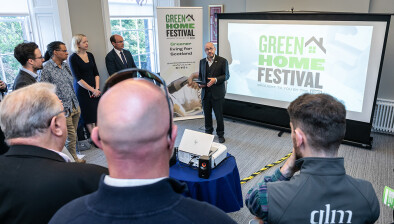‘Serious concerns’ raised over discontinuation of solar PV funding

Alan Wilson
The Construction Industry Collective Voice (CICV) has raised “serious concerns” over the Scottish Government’s decision to discontinue funding for solar photovoltaic (PV) and battery storage under the Home Energy Scotland Grant and Loan scheme.
Energy Saving Trust Scotland last week pulled both battery and solar panel funding from the government-funded Home Energy Scotland (HES) Grants and Loan Scheme.
It said: “Funding for solar PV and energy storage systems (electricity and heat batteries) will no longer be offered through the scheme. From today (6 June 2024), no new customers will be able to apply for solar PV and battery storage, even when installed together with a heat pump.”
Previously Home Energy Scotland was offering up to £11,500 in grants, plus interest-free loans, covering air source heat pump, solar installation and battery. But as of last week, funding for solar and battery installations ceased.
This solar panel and battery combination, alongside an air-source heat pump, is seen by many heat pump owners, as a key accessory in bringing their electricity bills down
Alan Wilson, who is chair of CICV, a coalition of 29 professional and trade bodies within the UK construction sector, has highlighted the potential setbacks the decision poses to Scotland’s low-carbon transition efforts.
He said: “Solar PV and battery storage are not just about clean energy; they represent a commitment to long-term economic stability and environmental stewardship. Their exclusion from funding signals a worrying shift in policy that will undoubtedly discourage investment and innovation in Scotland’s renewable sector.
“A stable policy environment is essential for businesses to commit resources to developing, installing and maintaining low-carbon technologies. The current policy fluctuation risks stalling Scotland’s progress towards its environmental goals and shaking the confidence of market investors and the public alike.
“It will also significantly affect the training and skills development businesses within the renewable sector undertake. After numerous false starts with renewable technology funding, installers are increasingly wary of committing to training when support is so frequently withdrawn. Businesses need clarity and certainty to invest effectively, and this unpredictability severely hampers their ability to do so.
“This decision also directly and profoundly impacts Scottish households, especially those in more vulnerable economic positions. Without financial support, the initial cost of transitioning to renewable energy sources becomes prohibitive for many. This not only slows down individual progress towards energy independence but also widens the socioeconomic divide in access to clean technology. Ensuring all communities can participate and benefit from Scotland’s energy transition is crucial for its overall success and social equity.
“Moving forward, we must ensure continuity and consistency in our approach to realise our low-carbon ambitions fully. The abrupt end to funding these critical technologies could undermine the trust consumers and the marketplace has in all the nation’s low-carbon transition strategies. As always, we advocate dialogue to find a way forward rather than undermining Scotland’s sustainable future.”
Helen Melone, head of heat and solar at Scottish Renewables, said the withdrawal ould mean that homeowners fitting heat pumps could be more vulnerable to high energy bills.
“Our concern,” she added, “is that this impacts on the ability of households to mitigate their own energy bills. It’s concern over affordability for households.”
“This will impact the people who would want to put solar panels on their roof as a way to stop themselves being hit by big, sudden price shocks as happened recently with energy bills went very high.”







